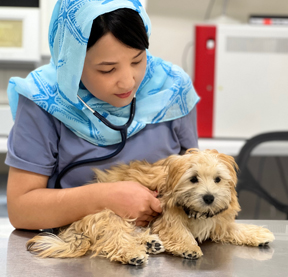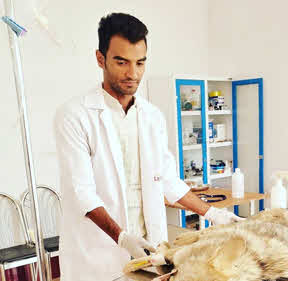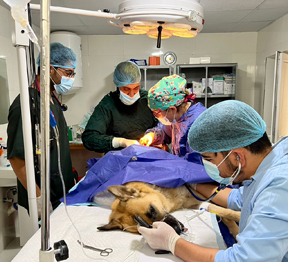Dr. Tahera Rezaei

Photo by Paola Medina
While preparing for exams she must pass in order to practice as a veterinarian in the United States, Dr. Tahera Rezaei works as a veterinary technician at a hospital in New York City.
 Listen to this story.
Listen to this story.
It has been a little more than a year since the United States completed its abrupt withdrawal from Afghanistan. The messy retreat saw the Taliban return to power, upending the lives of millions fearful of the militant group's oppressive rule, and devastating parts of a once-flourishing veterinary community.
The refugee crisis that ensued continues to profoundly affect the lives of veterinarians in varying ways — some distressing and some uplifting.
The VIN News Service spoke to four practitioners willing to share their experiences. Two fled Afghanistan, one in especially heart-pounding circumstances, and are among those forging new lives in Western countries such as the United States, Canada and the United Kingdom.
Many still are trying to flee, including a practitioner who tells a harrowing tale of escaping to Pakistan last year after a bounty was placed on his head by the Taliban. Still stuck in Pakistan, he desperately is seeking an offer of a job or a student visa in the West.
Others are moving in the opposite direction. Intrepid non-Afghan practitioners, hailing from countries such as the U.S. and U.K., have traveled to Afghanistan to offset a massive brain drain that weighs on animal welfare. One, an American, recounts the highs and lows of practicing as a foreign woman in Kabul.
Conditions on the ground remain volatile. Since the Taliban reassumed power in August 2021, the regime has once again imposed an extreme interpretation of Islamic law, despite pledges to respect the rights of women and minority communities. The regime has violated women's and girls' rights to education, work and free movement, forced them to wear coverings from head to toe and contributed to a surge in rates of forced and child marriage, according to a report published in July by Amnesty International.
At the same time, it appears the Taliban is tolerating the presence of some foreign aid workers, including female veterinary professionals, at least for now.
New hope in New York
Dr. Tahera Rezaei has mixed feelings about making it out.
Before she escaped Afghanistan last year, she was the only woman in the capital Kabul with her own veterinary clinic.
Now, she's in Port Jefferson, New York, preparing to take the exams she must pass to practice in the U.S. Meanwhile, Rezaei works as a veterinary technician at a hospital in New York City, and volunteers at an animal shelter on Long Island.
"I didn't have any plans to move or emigrate to other countries because I had a good job, I had my own clinic, and I was so happy helping animals there," Rezaei said. "When I decided to leave, it was the worst feeling in my life, and I'll never forget it."
Looking on the bright side, Rezaei said she's enjoying many elements of her new home, near the "beautiful city" of New York. "You feel more freedom here," Rezaei said, adding: "One thing about New York is we have different people here from everywhere, but everyone respects each other." She'd like to open an animal shelter somewhere in the city, with an in-house veterinary clinic.
Reaching America was hard. Rezaei escaped in the chaotic final hours of the U.S. withdrawal, characterized by scenes of desperation and violence at and around Kabul Aiport that were beamed to screens around the world. She and her husband had obtained visas to the U.S. and, after several unsuccessful attempts to get past Taliban checkpoints, made it to the airport. There they lingered, hoping some relatives could join them. "I was waiting for my family, but they couldn't make it," Rezaei said. "That night was a nightmare."
The couple spent the entire night sitting on the floor of a dilapidated indoor part of the airport used by U.S. soldiers. The next day, military personnel insisted they board a plane because it was the last evacuation flight out, Rezaei said. She laments not being able to say goodbye to her mom and dad.
"I would like to go back to Afghanistan because it's my motherland and I love my country," she said — "but when there is no more Taliban."
From Pakistan, a cry for help
While some veterinarians have been lucky to escape, others still are trying to reach the West. More than 3 million Afghans, for instance, are living in Pakistan, many of whom fled the Taliban last year.
Several weeks ago, a Dr. Mohammed (not his real name) sent an email to VIN News pleading for assistance. He requested to use a pseudonym for this article for fear of being tracked by the Taliban.
Seeking to verify Mohammed's identity, VIN News spoke to an Englishwoman who confirmed he was among several Afghan veterinarians for whom she and a friend had provided funding support. She asked to remain anonymous for this article. VIN News also obtained copies of Mohammed's passport, graduation certificate and other material.
Among the documents is a letter from the Royal College of Veterinary Surgeons accepting Mohammed to undertake a licensing exam in 2023, should he make it to the U.K. He hopes to obtain a visa by way of a job offer, perhaps as a veterinary technician, or an offer of an educational scholarship.
Mohammed is Hazara, an ethnic group persecuted by the Taliban. He said he received a chilling call last year during which they threatened to kill him and his wife in brutal ways. He suspects he was especially singled out because his family was relatively wealthy and included members who had worked with Western entities and Afghan opposition parties, including one who had been imprisoned during the Taliban's former reign in the 1990s, and another who had served in the Afghan military.
"We were so worried and confused about what to do," Mohammed said about his final days at home. "Just hours before the Taliban came, we took some food and clothes and went to the mountains." On sneaking back to town four days later to replenish food supplies, Mohammed learned that his poultry services company, house, vehicles and all other property had been claimed by the Taliban. A financial reward, he said, was offered for information on his location.
While subsequently moving through Afghanistan to obtain travel documents, Mohammed said, he evaded authorities by, at one point, hiding down a well and, later, on a chicken farm. Now in Pakistan, he said he, his wife and baby son — born while they were on the run — have little money to live on, and fear being labeled as Hazara and fugitives in a country that often supports the Taliban.
Mohammed, who graduated from Kabul University in 2017, said he worked as a veterinarian at various companies and organizations, including one that helped female farmers, before setting up a business that offered poultry services and treatment for small animals.
He feels drawn to the U.K. because he has received financial support from people there, but would be happy to move to North America, Australasia or elsewhere in Europe. "It's my hope to work as a veterinarian in the U.K.," he said. "Unfortunately, I know that opportunity is so difficult. But it's not impossible. It's possible."
A long road to Calgary
Dr. Jawad Afzali's career path took its first turn in 2018, during what was his final year of veterinary school in Herat, a province in northwestern Afghanistan.
Dr. Jawad Afzali

Photo courtesy of Dr. Jawad Afzali
Dr. Jawad Afzali attends a cat in Herat, Afghanistan. Afzali has since fled to Calgary, Canada, where he is studying for a master's degree in veterinary medicine.
Afzali saw a car crush a cat. The driver didn't stop to see what had happened to the poor animal.
"It was the last seconds of the cat's life and I was watching him and I was trying to do something," Afzali said. "But I didn't really have enough knowledge to help."
Afzali explained that in Afghanistan, veterinary medicine traditionally is taught with an exclusive focus on large animals because of their economic value. Companion animals, he said, aren't seen as having much worth — small animals, especially dogs, are considered by many Afghans to be dirty.
Motivated by his feeling of helplessness after seeing the cat suffer, Afzali crossed the border to Iran to get experience working at a small animal clinic in Tehran. On his return, he set up what he said was the only small animal clinic in Herat province.
To his delight, he found that other locals harbored an urge to take care of small animals, too: Afzali's practice was a hit and, over its three-year existence, branched into treating strays. That all stopped last year when the Taliban, on the verge of returning to power, started threatening Afzali. He fled Afghanistan with his wife.
Unlike Rezaei's departure, there was no death-defying trip to Kabul Airport. Afzali and his wife swiftly obtained visas for Pakistan and flew there two days before the Taliban swept into Kabul. But their journey was only just beginning.
Afzali tells of being stuck in Pakistan for about seven months, relying on financial support from friends in faraway places, including a chemistry professor at a college in Fort Worth, Texas. He eventually was offered an opportunity to study for a master's degree in veterinary medicine at the University of Calgary in Canada. After a series of frustrating setbacks in Pakistan and Canada, he arrived in Calgary in July, initially struggling to adjust.
"During my first days in Calgary, I was trying to compare everything here to Afghanistan, and it made me really upset," Afzali said, noting that decades of conflict in his homeland had given its citizens little chance to improve their living standards. "Things are really good here," he said. "People are open-minded and I don't feel like a stranger, like I was feeling in Pakistan."
Once he completes his master's in two or three years, Afzali would like to pursue a career in academia or open a small animal practice in Calgary. How long he can stay in Canada largely will depend on the outcome of his application for permanent refugee status. He and his wife have a hearing scheduled this week.
"I still love my country, I still love those animals and I was doing something there that I really enjoyed," Afzali said. "I will go back. For sure. But not when a terrorist group has taken over the country. It's not acceptable for me to live under those conditions.”
Coming to Kabul
Not everyone in Afghanistan has felt compelled to leave. Charlotte Maxwell-Jones, the American head of nongovernment organization Kabul Small Animal Rescue (KSAR), has stayed there since the U.S withdrawal. The group currently houses about 250 animals and takes care of working dogs at several government facilities, including Kabul Airport.
Conditions in Kabul, Maxwell-Jones said, have become calmer since the U.S. departed and the Taliban took control of the country's institutions. KSAR employs 10 veterinarians, most of them local men, and offers employment opportunities for foreign practitioners, regardless of gender. "We need a lot of hands-on training to get the new vets up to speed," Maxwell-Jones said.
KSAR_Dog

Photo courtesy of KSAR
Dr. Susan Chadima and other staff at Kabul Small Animal Rescue perform leg-amputation surgery on a German shepherd. The dog, named Ava, had an old fracture that had never been repaired, and now is "doing great," Chadima said.
Among those helping out is Dr. Susan Chadima, an American who has spent much of her career switching between practicing at home and abroad. Chadima made her first trip to Afghanistan in 2005 and has worked with a range of organizations and institutions, such as Kabul University's veterinary school and a Dutch NGO that supports livestock-based livelihoods in Afghanistan. Chadima owned a companion animal practice in Maine for a time, selling it in 2016, in part to focus more on international work.
She, too, has noticed conditions becoming safer. That said, she has been living in a secure compound. "It's a little bit like a fancy prison," Chadima told VIN News on a Friday, her day off. "Today, I spent 45 minutes walking around the compound, doing multiple laps, and then I did some laundry.”
On the other six days of the week, Chadima and the KSAR team are busy performing a variety of procedures, such as spay/neuter and leg amputations, though they don't have the capacity to do more complex surgeries and lack gas anesthesia. "We do tumor removals on the outside of dogs, not internally," she said. "Trauma cases are a daily occurrence. Sometimes an eye needs to be removed."
Chadima said it's not surprising that many Afghans consider dogs unclean, given that most of the animals are strays that often carry rabies, mange and other diseases. Consequently, she has deep respect for KSAR's local employees, who take the social bias in stride. "People get told things like 'You're a dog-washer,' and that's about as low as it can get," she said. "But they're doing the work in spite of those challenges, developing relationships with animals, providing care. And some of them are really fabulous."
For other foreign veterinarians thinking of going to Afghanistan, she has a warning: "Sometimes, if you haven't worked in a deprived conflict zone, it can be a bit of a shock to the system."
Ultimately, though, Chadima reckons the job is highly rewarding. "It feels like you're really making a difference here, that you make the lives of animals a little bit better," she said. "You're talking about serious diseases, life-and-death situations and have an opportunity to see the world and animals through a different cultural lens. Not to denigrate our colleagues in the West, but there were times at home that I got a bit tired of talking to someone about why their cat wouldn't pee in a litter box."
Women from abroad, Chadima said, appear to be tolerated by the Taliban. "As a Western woman, you're kind of a third sex," she said. "To be a professional Afghan woman in this country right now is extraordinarily difficult. My female colleagues, women veterinarians that I have known over the years, they're all sitting at home."